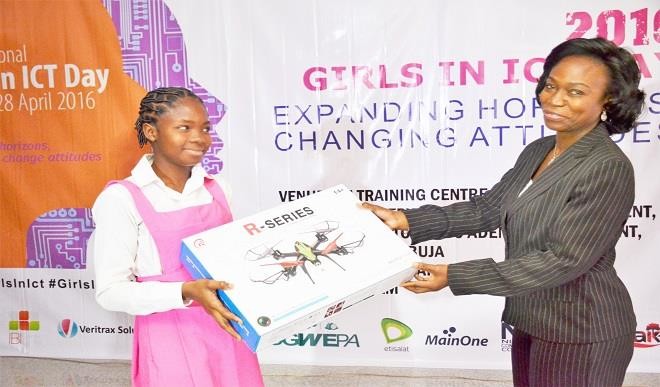Safeguarding the girl child’s future through ICT
Recently some nongovernmental organisations collaborated with some schools in the FCT and government agencies to explore the unlimited potentials of the girl- child being Information and Communication Technology (ICT) compliant. Unfortunately, most people view ICT as essentially a man’s play field and forbidden territory for women. This has not augured well for developing countries that […]


Recently some nongovernmental organisations collaborated with some schools in the FCT and government agencies to explore the unlimited potentials of the girl- child being Information and Communication Technology (ICT) compliant.
Unfortunately, most people view ICT as essentially a man’s play field and forbidden territory for women. This has not augured well for developing countries that are yet to fully embrace the advantages of ICT.
The percentage of girls or women presently in ICT is nothing to write home about and worried about this trend these partners – the IBI training centre, Veritax solutions, Media Range and some government agencies and schools – decided to create some level of awareness in a bid to correct it.
The International Telecommunications Union (ITU) had set aside April 26 to commemorate International Day of Girls in ICT with the theme, ‘Expanding Horizon, Changing Attitudes,” to encourage, create and empower young girls to see the potentials of embracing ICT.
The acting Director-General, National Information Technology Development Agency (NITDA), Dr Vincent Olatunji, who spoke at an event organised by the ICT stakeholders said girls proficient in Information Communication Technology (ICT) would never be out of job.
He added that ICT is fast improving the lives of people everywhere, through better health care, better education, better environmental management, better communications and better governance.
Represented by Mrs Tariundu Ndoni, the Assistant Chief Science officer, software and outsourcing department, the acting D-G noted that ICT has become an integral part of our daily life, having huge potentials for job and wealth creation, high increase in quality and standard of living and better service delivery.
Speaking to girls from several secondary schools in the FCT, he said, “ICT is now a major tool for our daily activities, hence there is a paradigm shift in the global development agenda towards the proper positioning of ICT as a driving force for virtually every sector of the Seconomy.”
ICT constitutes more than 80 percent of job components globally, Olatunji emphasised that ICT has improved the lives of people in every sector including healthcare, education, environmental management, better communications and governance.
Also emphasising the importance of ICT in the future scheme of things, the assistant director in charge of education and communication in the FCT Secondary Education Board, Mr Pius Ode Pius, said knowing the relevance of ICT, the FCT is working round the clock to ensure that all its schools became ICT compliant to face the challenges of the 20th Century.
He urged girls to take advantage of the information they would be exposed to in the course of the presentations to set career goals for the future.
One of the organisers of the programme, chief innovation executive for Veritax Solution, Mr Ayo Olagunju, said ICT could be a vital tool to diversify the economy.
“ICT is a multi-billion dollar industry and when you have ladies motivated and inspired to go into ICT companies, we are creating a future for this country,” he said.
Lamenting the low percentage of women participating in ICT, he added “for now, participation of girls is quite low.”
Olagunju said, “There is what we call gender imbalance all across the world. We have more men than women in ICT.”
He said the stakeholders were engaging professionals in the sector to mentor girls in building careers in ICT with specifics to any part of the sector.
“We are looking at going to schools to initiate IT clubs to work with the schools and see areas of deficiencies, like enhancing teachers’ competence in IT,” Olagunju said.
He said the International Girls Day in ICT has been celebrated with the International Telecommunications Union (ITU) since 2011 in over 150 countries with over 200,000 girls participating.
Stephanie Bryon, an ICT stakeholder, said the level of girls participating in ICT has improved over time.
A teacher from the Government Day Secondary School, Mr Amos Habila-Nyam, said MTN assisted their school with computer gadgets that aid girls to actively participate in learning the subject.
He urged the federal government to create an ICT debate forum among students as was done for literary debate, to serve as another way of creating awareness among girls.
Earlier, the Executive Director, IBI Training Centre, Ibrahim Baba Iyan, said in furtherance of the fifth goal of the Sustainable Development Goals (SDGs), there was need for girls to be more informed, especially in the field of ICT, adding there was room for entrepreneurs to drive the country’s economy away from oil.
“Early enough, we should tell these kids that we can do so many things and they can make Nigeria a better place. If they get the message early enough, I believe they can develop the right mentality for ICT,” he added.
Baba Iyan said: “Sensitization of ICT should be carried out from the elementary level at all tiers of educational institutions, and now that the era of oil boom that sustained the nation is over, we need to look for other areas to boost our economy and ICT is the way to go.”
